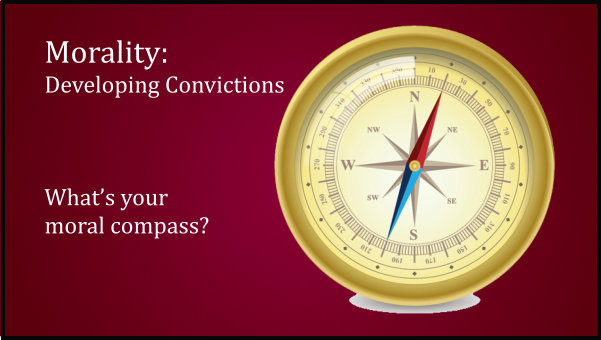By Tyson Thorne

In college I remember one class discussion about abortion. I asserted by conviction that abortion was immoral, which was quickly challenged by a classmate. “You don’t know that.” He angrily stared me down. “Just wait until you get your girlfriend pregnant then you’ll see it’s not so black and white.” The class went silent, a lot of people were staring at their desks. “I appreciate this is an emotional issue for you,” I began. “But I can tell you two things. One, I’ll never be in that position because I have convictions about my behavior with women. But assuming I were in that position, we develop convictions about such things first, so that should the time arise we can make the right decision.”
Morals are developed by our understanding of God’s character and the Bible; convictions are developed from our moral values. Convictions cover the areas that the Bible discusses and more. They extend to raising a family, conduct at work, and how we act after having made a bad decision. Unfortunately the Bible isn’t the only thing that forms our convictions.
The way we were raised, previous experiences and the influence of others can shape or morals and, therefore, our convictions. While young sports figures, celebrities and even comic book super heroes can shape our notions of right and wrong. So how can we be certain that our convictions are biblically based?
Developing biblical convictions involves comparing Bible teaching with these convictions from our backgrounds. Some will change. Many will remain. All must be tested. --Jerry White, Honesty, Morality & Conscience
While serving as an assistant pastor at a church in Littleton, Colorado one of the church members mentioned to me that he simply didn’t see any need for the book of Leviticus in the Bible. “I’ve read the Bible more than once, but I always skip over that book” he said. He reasoned that all these laws applied to the nation of Israel and no longer apply to those of us on this side of the cross.
“You’re missing out,” I told him. “Sure Leviticus is a lot of legal documentation, but it doesn’t just outline what Israel was responsible to enforce. Those laws tell us something about the character of God.” I challenged him to read the book sometime, and after each legal entry ask the question, what can I know about God from this law? By doing so we find a more sure foundation for our morality and convictions than our culture and family environment.
There are four trustworthy sources for building a moral foundation. I’ve talked a lot about the Bible already, and for good reason. It ranks as the number one source. Here are those sources listed in descending order of trustworthiness:
1. The Bible
2. Holy Spirit
3. Conscience
4. Christian friends and family
We’ll be looking at each of these tomorrow.
|
|